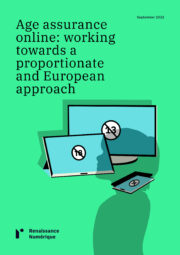Publication 15 September 2022
Age assurance online: working towards a proportionate and European approach

A protective legal framework, which establishes age assurance…
While children’s digital practices offer them immense opportunities to exercise their rights (right to education, information, freedom of expression, etc.), it can also expose them to risks : cyberbullying, online hate, grooming, exposure to illegal or harmful content, incitement to dangerous behaviour, addiction, exploitation of their personal data… For this reason, specific provisions for the digital environment, which introduce the need to check the age of Internet users, have been designed both at a European and national level.
Alexandra Mielle
Head of the "Audience Protection" department, French Regulatory Authority for Audiovisual and Digital Communication (Arcom)
The General Data Protection Regulation (GDPR), for instance, states that children deserve specific protection with regard to the processing of their personal data. More specifically, Article 8(1) states that “the processing of the personal data of a child shall be lawful where the child is at least 16 years old. Where the child is below the age of 16 years, such processing shall be lawful only if and to the extent that consent is given or authorised by the holder of parental responsibility over the child.” In France, Article 45 of the Data Protection Act (Loi informatique et libertés) completes this provision by setting the age limit at 15 and by introducing the principle of “dual consent”: when the child is under fifteen years of age, the processing is only lawful if consent is given jointly by the child concerned and the person or persons who have parental authority over the child.
GDPR, Article 8(1)
In addition, the revised Audiovisual Media Services Directive (the so-called AVMS Directive) introduces an obligation for Member States to take “appropriate measures to ensure that audiovisual media services […] which may impair the physical, mental or moral development of minors are only made available in such a way as to ensure that minors will not normally hear or see them” (Article 6a).
Other texts relating to the digital environment which will soon come into force or are being discussed at a European level, such as the Digital Services Act (DSA) and the proposed legislation on artificial intelligence (AI Act), include specific provisions for children, in particular concerning the prohibition of using their personal data for commercial purposes. In France, Article 227-24 of the Penal Code, Article 45 of the Data Protection Act (Loi informatique et libertés), Article 23 of the law aimed at protecting victims of domestic violence, the law on “child influencers”, the law aimed at reinforcing parental control over means of access to the Internet, and the law aimed at combating school harassment, complete the international and European legal arsenal.
Michael Murray
Head of Regulatory Strategy, Information Commissioner's Office (ICO)
…but whose implementation is unsatisfactory
In terms of the national, European, and international legal framework for the protection of children in the digital environment, cyberspace is not a “no-go area” for this audience. However, legal provisions related to online age assurance, in particular Article 8(1) of the GDPR and Article 227-24 of the French Penal Code, are generally poorly complied with. The issue at stake here is thus one of lack of supervision and enforcement.
We identify three major obstacles to the effectiveness of existing measures:
- the delicate balance between the protection of children online and other rights, such as the right to privacy;
- certain stakeholders’ economic objectives;
- and the relative lack of homogeneity of the legal framework in the European Union Member States, which makes compliance difficult.
In addition, some of the technical solutions used for age assurance are particularly intrusive and may lead to an imbalance in the guarantee of fundamental rights and freedoms.
Implementing a common framework of requirements at European level
To overcome these obstacles, we call for the implementation of a common framework of requirements at European level. The concept of proportionality and the accountability of online services providers are at the heart of this approach, which relies on three pillars :
RECOMMENDATIONS
#1 - Implementing a common code of conduct at European level
#2 - Conducting impact assessments rather than risk assessments
#3 - Imposing “strict” age assurance where legal provisions to restrict or prohibit access do exist
-
News 12 April 2022

-

Publication 29 April 2020
Cyberbullying: A review of the literature


